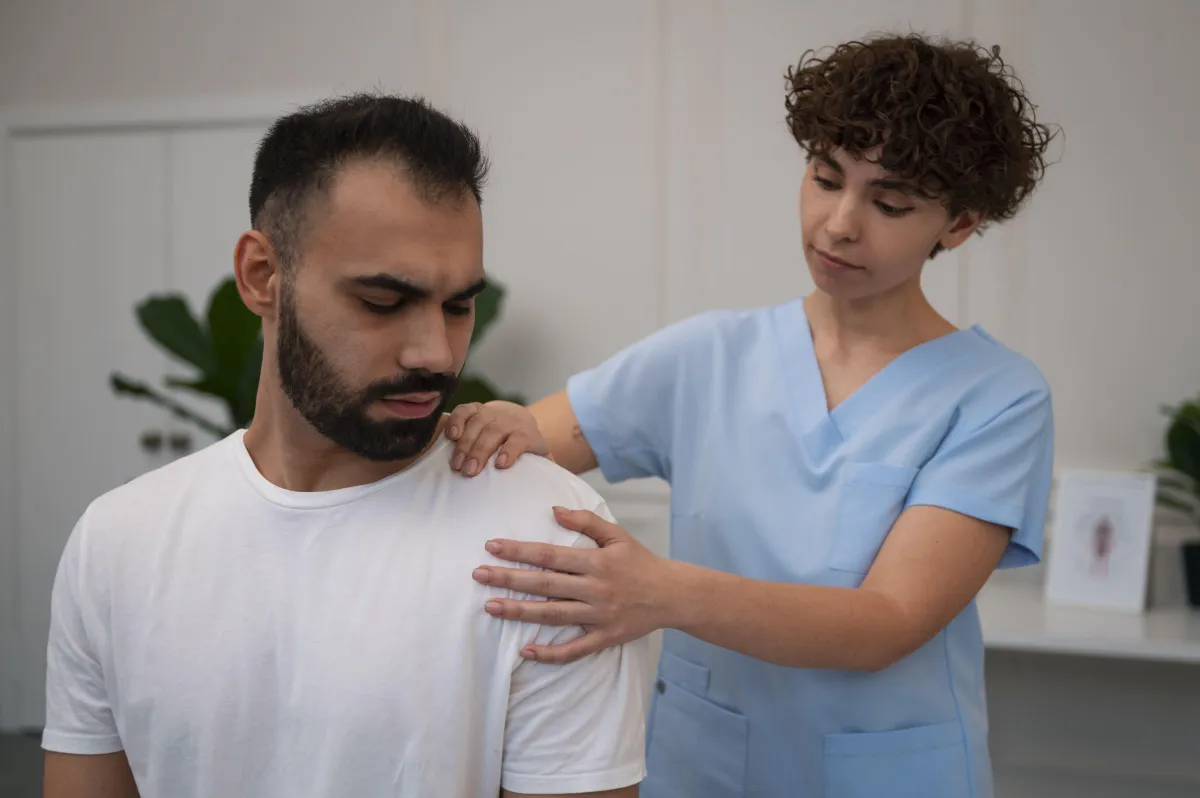Shoulder Pain Physiotherapy in Clifton, NJ
Clifton Physical Therapy

What is Shoulder Pain and Which Conditions Cause it?
Shoulder pain describes discomfort around the ball-and-socket joint and nearby muscles, tendons, and bursae. Common causes include rotator cuff tendinopathy, impingement (bursa or tendon pinching under the acromion), adhesive capsulitis (frozen shoulder), labral injuries, and post-surgical stiffness.
Symptoms range from a dull ache and night pain to sharp weakness with overhead activity — each pattern points clinicians toward a different diagnosis. Evidence-based physical therapists use a combination of history, movement testing, and special tests to identify the likely pain generator before designing treatment.
What Are the Most Common Types of Shoulder Pain or Injury?
Shoulder pain can arise from a wide range of conditions that affect muscles, tendons, ligaments, and joints. Some of the most common include:
Biceps Tendonitis
Frozen Shoulder (Adhesive Capsulitis)
Impingement Syndrome (Shoulder Impingement)
Osteoarthritis (Shoulder Arthritis)
Overuse Injuries (Pitcher’s, Swimmer’s, or Tennis Shoulder)
Pre- and Post-Surgical Shoulder Rehabilitation
Rotator Cuff Tear
Rotator Cuff Tendonitis
Shoulder Bursitis
Shoulder Instability
Labral Tear (Shoulder Labrum Tear)
Shoulder Sprain or Strain
Calcific Tendonitis
What Is the Best Treatment for Shoulder Pain?
The ideal treatment depends on the specific cause and severity of your shoulder problem. In most mild to moderate cases, physiotherapy or chiropractic care effectively relieves pain, restores motion, and improves shoulder strength. For more serious injuries — such as a rotator cuff tear or shoulder dislocation — additional interventions like corticosteroid injections or surgery may be required.
At Clifton Physical Therapy, shoulder pain is treated using a combination of advanced, evidence-based techniques, including:
Soft Tissue Mobilization
Joint Mobilization and Manipulation
Strength and Stretching Exercises
Active Release Technique® (ART)
Cold Laser Light Therapy
Graston Technique®
Kinesiology Taping
Why does shoulder pain persist without treatment?
Shoulder problems often begin with overload, poor posture, or a single injury; they persist when movement patterns, strength imbalances, or untreated inflammation remain. When rotator cuff muscles are weak or the scapula (shoulder blade) doesn’t move smoothly, the shoulder can develop repetitive strain and tendon irritation.
Left unaddressed, pain may lead to guarding, reduced range of motion, and secondary stiffness (sometimes progressing toward adhesive capsulitis). Early, targeted intervention reduces the risk of chronic symptoms and the need for injections or surgery.
Who should see a physiotherapist for shoulder pain?
Anyone whose shoulder pain lasts beyond a few weeks, worsens with activity, reduces sleep quality, or limits work and sport should seek a professional evaluation. People with weakness, repeated catching or instability, or persistent loss of motion benefit especially from physiotherapy.
A therapist will triage urgent red flags (fever, rapidly increasing swelling, or neurologic loss) and either manage the problem or refer for imaging or specialist care. Seeking physiotherapy early often shortens recovery and restores confidence in movement.
How does physiotherapy treat shoulder pain?
Physiotherapy for the shoulder is a progressive, evidence-based blend of education, manual techniques, and therapeutic exercise tailored to your problem and goals. First, education reduces fear and explains safe movement and activity modification. Therapists use hands-on joint and soft-tissue mobilization to ease pain and regain motion when needed.
The cornerstone, however, is a graded exercise program that restores rotator cuff and scapular muscle control, improves range of motion, and builds progressive strength and endurance. High-quality studies and systematic reviews support exercise-based rehabilitation for rotator cuff–related pain and other non-traumatic shoulder conditions, showing consistent improvements in pain and function when programs are appropriately dosed and progressed.
When will I see results from physiotherapy?
Recovery timelines depend on the cause, severity, and duration of your shoulder pain. Mild overuse injuries may show improvement within two to four weeks, while chronic conditions such as frozen shoulder or rotator cuff tears can take several months of consistent therapy.
Progress isn’t always linear — some soreness can occur as tissues adapt to new movements. However, patients who follow their therapist’s recommendations, perform home exercises, and maintain proper posture generally recover faster. Physiotherapists adjust treatment intensity weekly to ensure steady improvement and prevent flare-ups.
Long-term success also depends on lifestyle factors such as workspace setup, sleeping positions, and exercise habits. Regular check-ins help your therapist identify subtle compensations early, ensuring lasting shoulder health even after formal sessions end.
What exercises help relieve shoulder pain?
A key component of shoulder physiotherapy is progressive exercise therapy, tailored to each individual’s condition. Commonly recommended movements include:
Pendulum exercises
Scapular retraction drills
Rotator cuff strengthening
Posterior capsule stretches
Wall slides and shoulder flexion drills
How to book your appointment
If shoulder pain is disrupting your daily life, it’s time to take the first step toward recovery. Contact Clifton Physical Therapy at (973)-241-1338 to schedule your personalized physiotherapy assessment today.
Our expert therapists will guide you through a tailored recovery plan that relieves pain, improves mobility, and prevents future injury.
What others are saying
"I recently had ankle surgery and Clifton PT has been nothing short of amazing! My goal was to get back to playing soccer as quick as possible before the college season started and so far I'm right on track. Izzy, Bianca, Tiff, and John have gone above and beyond to make sure I'm back to 100%. Couldn't be more grateful to be treated by the best team ever!." - Nat Rufino

All the therapists at Clifton Physical Therapy are awesome, but I spend most of my time with Izzy and Bianca—and they’ve been amazing. They’re enthusiastic, knowledgeable, and always take the time to explain what I’m doing and what my issues are. Their positive energy and clear communication make a big difference in my recovery." - Bryan Tompkins

"Going Clifton physical therapy was one of the best thing that came out of my back pain! Every single staff member is amazing and cares for your recovery! I have been with them for the past couple of months and now continuing their workout program! I can’t recommend them enough! Tiffany, Izzy, Bianca and everyone else I have worked with there! Can’t rave about them enough!!." - Monica Mehta

"Clifton Physical Therapy has been a great place for me to heal my meniscus tear. The staff is very knowledgeable and friendly, and has been extremely helpful in guiding me through my recovery. I highly recommend their services.." - Kelly Bevando

Clifton Physical Therapy
✆ Phone (appointments): (973)-241-1338
Address: 1059 Bloomfield Ave, Clifton, NJ 07012
